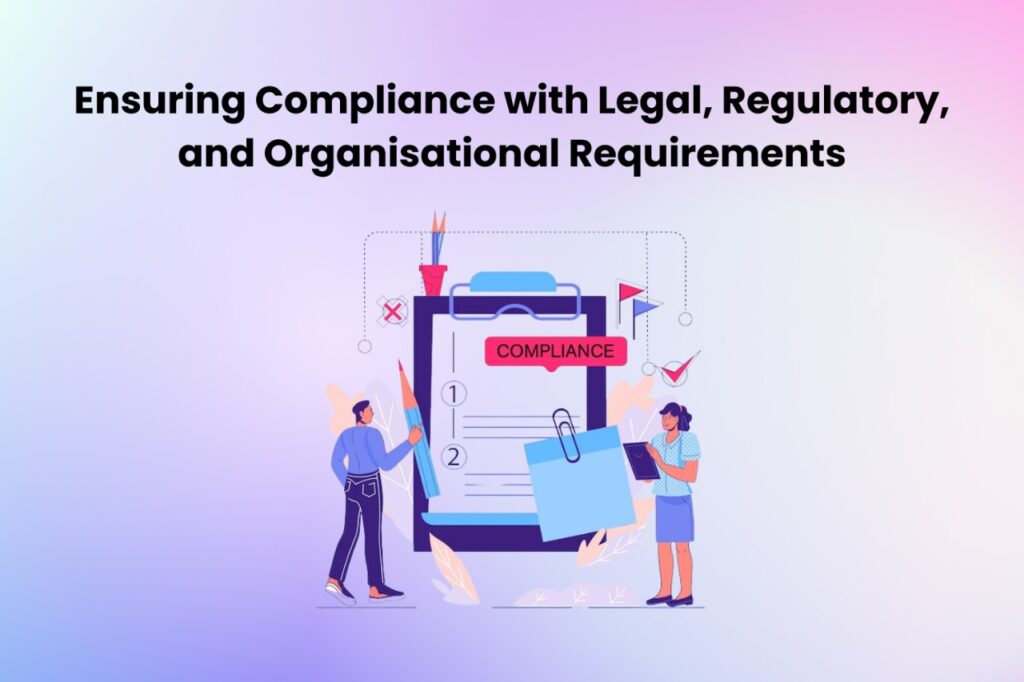Ensuring Compliance with Legal, Regulatory, and Organizational Requirements
It is important for businesses today to uphold to the compliance of the Organization as well as the law. By doing so, a business protects its reputation and builds the stakeholder’s trust. In information security, establishing and maintaining compliance is especially important. In this blog, we will examine the important components of guaranteeing compliance, with an emphasis on the CISM Certification and CISM Domains.

Table of Contents
The Significance of Compliance
Compliance is a dynamic process that helps an organisation stay in line with the constantly shifting legal and regulatory Norms; it is not just a box to be checked. It entails abiding by internal policies, rules, and laws to maintain orderly operations within the legal framework. Compliance is a big deal in the information security industry, serving as the bases for trust. It’s not just about avoiding legal trouble. It’s also about protecting private information, upholding client confidence, and creating a strong corporate environment.
CISM Certification and Information Security Compliance
CISM is basically someone who is a certified information security management. A professional license proves you are an expert at keeping a company’s digital information safe and secure. The certification is well-respected around the world. It is only offered by one organization, which is known as ISACA.
CISM Domains
Investigating CISM’s domains is crucial to understanding its role in compliance. CISM domains includes the following:
- Information security governance
- Information risk management
- Information security program development and management
4. Information security incident management
Every domain plays a part in building an all-encompassing and efficient framework for information security.
Information Security Governance
Creating and maintaining an information security governance structure is the primary objective of this domain. It guarantees that information security plans correspond with the aims and objectives of the organisation. Understanding the legal and regulatory environment is essential for compliance, and CISM gives professionals the skills to smoothly incorporate these needs into governance frameworks.
Information Risk Management
Information security involves a lot of risk, which requires proper management to ensure compliance. CISM enables organisations to make well-informed decisions on how to manage risks and tactics to irradicate them. It does so by equipping individuals with the skills to recognise and evaluate information security risks.
Information Security Program Development and Management
For compliance, putting in place efficient information security programs is essential. The knowledge and skills required to create, oversee, and coordinate information security programs with organisational goals are provided by CISM. This domain ensures robust security measures and adheres to legal and regulatory requirements.
Information Security Incident Management
No system is impervious to events completely, but an organisation’s resilience is determined by its ability to bounce back. With the help of CISM, professionals can create and oversee incidents, come up with an with an appropriate response and recovery program that will guarantee that every possible breach is handled legally and promptly.
Navigating Legal and Regulatory Norms
Maintaining compliance requires negotiating an intricate web of legal and regulatory obligations. Organizations need to stay updated with the constant changes in the norms, including industry-specific rules and data protection requirements. With its focus on practical application, the CISM certification equips professionals to easily incorporate legal and regulatory requirements into information security operations.
Data Protection Regulations
General Data Protection Regulation (GDPR) help you set strict guidelines to process personal data. Data protection is an important component of compliance. Professionals with CISM certification are better equipped to create and execute data protection strategies that respect individuals’ rights to privacy by sticking to these requirements.
Industry-Specific Compliance
CISM prepares people to handle the diversity of compliance needs in various businesses. With regard to healthcare, PCI DSS, banking, and other industries with their own regulations, the CISM certification offers a thorough grasp of the compliance requirements unique to each business.
Building a Culture of Compliance
Setting a mindset where all employees are aware of their responsibility to uphold security and compliance is a great way to create a culture of compliance. With its focus on education and communication, CISM equips professionals to advocate for this cultural shift.
Employee Training and Awareness
Human mistakes are one of the key obstacles to maintaining compliance. The CISM certification highlights the importance of employee education and awareness campaigns. Making sure that all members are aware of the value of maintaining compliance.
Consistent Monitoring and Improvement
You will need to continuously monitor and improve Compliance as it is not static. While facing changing regulations and threats, CISM specialists are skilled in creating monitoring systems and feedback loops that maintain the information security Norms’s compliance and resilience.
Conclusion
To sum up, ensuring that organisational, legal, and regulatory requirements are met is necessary and strategically critical. With its extensive areas, the CISM certification is essential for equipping information security professionals to handle the complex world of compliance. CISM is vital in the quest for information security excellence, helping organisations create a culture of compliance and comprehend the subtle legal issues.
Therefore, the route toward compliance starts with a strong foundation, represented by the Certified Information Security Manager certification. This foundation can be used to strengthen your organisation’s security posture or to improve your resume.


